牛津英语四年级下册unit
四年级下册英语讲义-Unit 2 How does it feel?知识点梳理含习题 牛津上海版

Unit 2 How does it feel? 知识点梳理含习题I.Words 单词1.hard adj. 坚硬的[例句] The table is hard.这个桌子很硬。
[反义词] soft柔软的[例句] This toy bear is very soft. 这个玩具熊很柔软。
2.soft adj. 柔软的[例句] This kind of pencil case is very soft. 这种笔袋很柔软。
3.rough adj. 粗糙的[例句] The paper feels rough.这纸摸起来很粗糙。
[反义词] smooth光滑的[例句] The wooden chair is big and smooth. 这把木椅子又大又光滑。
4.smooth adj. 光滑的[例句] The ball is smooth and soft. 这个球又光滑又软。
5.sharp adj. 锋利的[例词] a sharp knife 一把锋利的小刀 a sharp pencil 一支尖铅笔sharp teeth锋利的牙齿[例句] Be careful! The axe is sharp! 当心!这把斧子很锋利![反义词] blunt钝的;不锋利的These pencils are blunt.这些铅笔不尖了。
6.thin adj. 薄的;细的[例词] a thin boy 一个瘦弱的男孩 a thin book 一本薄书[例句] I have a thin notebook.我有一个薄的笔记本。
[反义词] thick 厚的;粗的[例句] Why don’ you wear your thick coat?你为什么不穿你的厚外套呢?7.knife n. 小刀[例句] I have a nice knife.我有一把很好的小刀。
Can you lend me your knife? 你能借给我你的小刀吗?[复数形式] knives8. pencil n. 铅笔[例句] My sister has a thin pencil. 我妹妹有一支细铅笔。
沪教牛津版(深圳用)四年级英语下册Unit 3 Look and see 看和看见 知识梳理
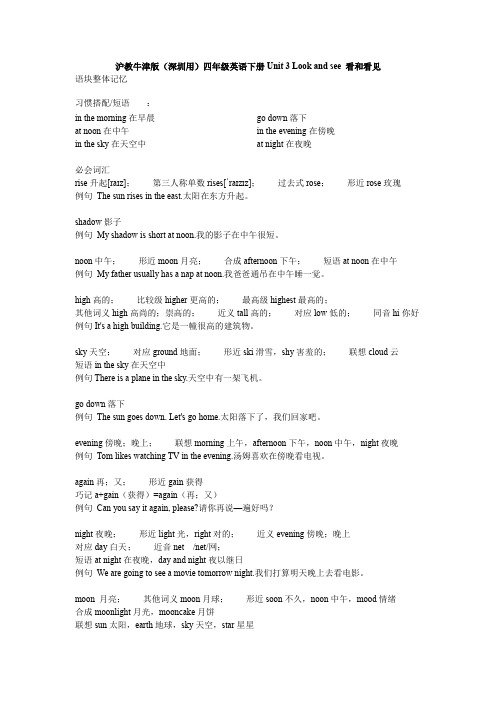
沪教牛津版(深圳用)四年级英语下册Unit 3 Look and see 看和看见语块整体记忆习惯搭配/短语:in the morning在早晨at noon在中午in the sky在天空中go down落下in the evening在傍晚at night在夜晚必会词汇rise升起[raɪz];第三人称单数rises[ˈraɪzɪz];过去式rose;形近rose玫瑰例句The sun rises in the east.太阳在东方升起。
shadow影子例句My shadow is short at noon.我的影子在中午很短。
noon中午;形近moon月亮;合成afternoon下午;短语at noon在中午例句My father usually has a nap at noon.我爸爸通吊在中午睡一觉。
high高的;比较级higher更高的;最高级highest最高的;其他词义high高尚的;崇高的;近义tall高的;对应low低的;同音hi你好例句It's a high building.它是一幢很高的建筑物。
sky天空;对应ground地面;形近ski滑雪,shy害羞的;联想cloud云短语in the sky在天空中例句There is a plane in the sky.天空中有一架飞机。
go down落下例句The sun goes down. Let's go home.太阳落下了,我们回家吧。
evening傍晚;晚上;联想morning上午,afternoon下午,noon中午,night夜晚例句Tom likes watching TV in the evening.汤姆喜欢在傍晚看电视。
again再;又;形近gain获得巧记a+gain(获得)=again(再;又)例句Can you say it again, please?请你再说—遍好吗?night夜晚;形近light光,right对的;近义evening傍晚;晚上对应day白天;近音net /net/网;短语at night在夜晚,day and night夜以继日例句We are going to see a movie tomorrow night.我们打算明天晚上去看电影。
牛津上海版(三起)英语四年级下册Module 2 Unit 6 Music课件

music room
piaቤተ መጻሕፍቲ ባይዱo
guitar
violin
drum
Whose guitar is it?
Look at the name. It’s ______’s guitar. _J_o_e__ can play the guitar.
music room
Whose _____ is it? Look at the name. It’s ______’s______.
Jill likes _m_u_s_ic_ too. It’s __ni_c_e_. She can’t play the_v_i_o_li_n. She canp_l_ay__th_e_g_u_it_a_r _very well. But her guitar is _a_t_h_o_m_e_. She can _s_in_g_ and _d_a_n_c_e_ in the music room. She can _e_n_j_o_y_ the music too. Music makes her happy!
drum
I can hear the __d_ru_m__ . __“B__o_o_m_-_b_o_o_m__-b_o_o_m__.”. It’s _e_x_c_it_i_n_g_. I like music.
(兴奋的)
drum
“zeng-zeng-zeng”
“Boom-boom-boom.”
“ting-ting-ting” “zing-zing-zing”
Music room
music
and…can play the
.
music
but…can play the
新译林牛津小学英语四年级下册Unit5教案

Unit5 Seasons
spring warmfly kites/go boating
summerhoteat ice creams/ goswimming
autumncoolhave picnics/ go climbing
wintercoldmake snowmen/现方式做保护处理对用户上传分享的文档内容本身不做任何修改或编辑并不能对任何下载内容负责
—-可编辑修改,可打印——
别找了你想要的都有!
精品教育资料
——全册教案,,试卷,教学课件,教学设计等一站式服务——
全力满足教学需求,真实规划教学环节
最新全面教学资源,打造完美教学模式
3.自由地表达每个季节的气候特征和在每个季节里通常做的事情。
4.仿照书上Fun time完成“我最喜欢的季节”的英文明信片制作。
重
难
点
1.能听懂、会读、会说、会写单词:spring, summer, autumn, winter, hot, warm, cool, cold.
2.能听懂、会读、会说句子:We like spring/summer/autumn/winter. In…, it is warm/cool/hot/cold. We…(具体活动)
Ss: Yes, how nice!
T: It’s Tommy’s card. Let’s listen to him.
(播放书上Tommy介绍的音频)
Which season does Tommy like?
(如果学生听不明白does,教师可提示Spring? Winter? ) Ss: winter
2.Task One--I can talk about the four seasons
沪教牛津版小学英语四年级下册单词

yours
every year
全
Unit 10
英
中
花园
叶子(复数leaves)
给……浇水
植物
他们;她们;它们
(使)生长;成长
种子
每天
garden
leaf
water
plant
them
grow
s
Unit 11
英
中
歌曲
电影院
博物馆
动物园
刷牙
o'clock
time
half
quarter
wash
dinner
start
catch
get up
brush ... teeth
全
Unit 7 - 02
英
中
……点半
去上学
洗脸
吃早餐
吃午餐
吃晚餐
上床睡觉
half past ...
go to school
wash ... face
添加标题
go to bed 上床睡觉
03
06
添加标题
go to school 去上学
添加标题
have lunch 吃午餐
Unit 8 - 01
week 星期
with 和……一起
Tuesday 星期二
Monday 星期一
Wednesday 星期三
Thursday 星期四
Friday 星期五
game 游戏
basketball
volleyball
us
table tennis
沪教牛津版(深圳用)四年级英语下册Unit 1 Touch and feel 触摸和感觉 知识梳理

沪教牛津版(深圳用)四年级英语下册Unit 1 Touch and feel 触摸和感觉语块整体记忆习惯搭配/短语:a toy dog/bear一个玩具狗/熊an apple一个苹果惯用语:Well done!做得好!必会词汇feel摸起来;感到;过去式felt;第三人称单数feels;形近feed喂养近音fill 装满;转化feel n.触觉;派生feeling n.感受soft柔软的;对应hard坚硬的;例句Silk feels soft.丝绸摸起来很柔软。
touch碰;触摸;第三人称单数touches;形近teach教;转化touch n.触觉例句Don't touch it!不要触摸它!hard坚硬的;其他词义hard艰难的;形近harm伤害,yard院子;对应soft柔软的例句The stone is hard.这块石头很坚硬。
thick厚的;粗的;比较级thicker更厚的;更粗的;最高级thickest最厚的;最粗的其他词义thick浓密的;形近think思考,chick小鸡;对应thin薄的;细的例句That book is very thick.那本书很厚。
thin薄的;细的;比较级thinner更薄的;更细的;最高级thinnest最薄的;最细的其他词义thin瘦的;形近then然后;对应thick厚的;粗的近音thing物,东西例句Cut the vegetables into thin strips.把蔬菜切成细条。
blind瞎的;失明的;形近blink眨眼睛;派生blindly adv.盲目地;摸黑地转化blind v.使失明;联想deaf耳聋的;例句There is a blind man over there.那边有一个盲人。
noise响声;吵闹声;形近nose鼻子;派生noisy adj.吵闹的;联想sound声音例句Don't make a noise.别出声。
四年级下册英语课件-Unit 11《Children’s Day》|牛津上海版
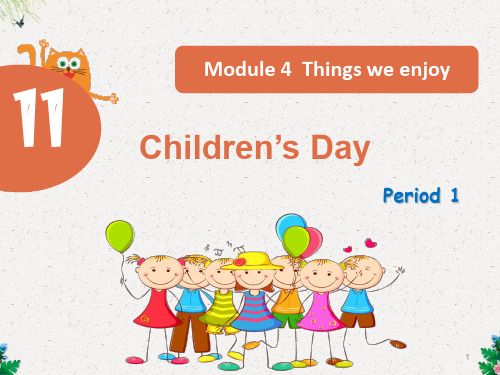
Think and write
What can you do on Children’s Day?
14
Homework
1. Listen to Page54 “Listen and say” and repeat three times.
2. Choose one to do. (1) Retell Alice's Children's Day and
6
Discuss 1. What does Alice do at the party?
2. What does Alice see at the zoo?
7
Listen and repeat
8
Listen and repeat
9
Group work
Hello, Jill. It’s Children’s Day. How are you today? Fine, thanks. Good morning, Miss Fang. Good morning. Happy Children`s Day. Our classroom looks beautiful. Let’s begin our party. OK. Let’s sing a song. What are you going to do this afternoon? I`m going to the zoo with my parents. Have a good time. Thanks. You, too.
write it down. (2) Use “On Children’s Day, I can ...” to
write at least three sentences.
新牛津译林版四年级下册英语全册知识点
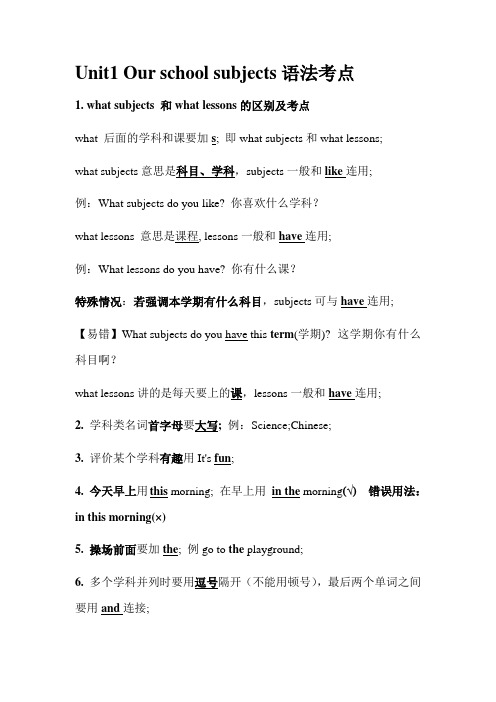
Unit1 Our school subjects语法考点1. what subjects 和what lessons的区别及考点what 后面的学科和课要加s; 即what subjects和what lessons;what subjects意思是科目、学科,subjects一般和like连用;例:What subjects do you like? 你喜欢什么学科?what lessons 意思是课程, lessons一般和have连用;例:What lessons do you have? 你有什么课?特殊情况:若强调本学期有什么科目,subjects可与have连用;【易错】What subjects do you have this term(学期)? 这学期你有什么科目啊?what lessons讲的是每天要上的课,lessons一般和have连用;2.学科类名词首字母要大写; 例:Science;Chinese;3. 评价某个学科有趣用It's fun;4. 今天早上用this morning; 在早上用in the morning(√) 错误用法:in this morning(×)5.操场前面要加the; 例go to the playground;6. 多个学科并列时要用逗号隔开(不能用顿号),最后两个单词之间要用and连接;例:We have Music, Art, PE and Maths.Unit2 After school语法考点1. 星期考点①星期一到星期天分别是(拼写):星期一Monday;星期二Tuesday;星期三Wednesday;星期四Thursday;星期五Friday;星期六Saturday;星期天Sunday;②英语中,一个星期的第一天是星期天;【易错】Sunday is the first(第一) day of a week(一周).③在星期几前面的介词用on; 即on + 星期几; 在星期几的上午或下午直接在星期后加morning或afternoon; 正确用法:on Sunday morning 在星期天上午(√) 错误用法:in the morning on Sunday(×)④对星期几提问特殊疑问词用What day; 回答星期几用It's + 星期几;2. It's time for / to考点(是时候做...)It’s time for后接名词例:It's time for school. school 为名词It's time to 后接动词词组例:It’s time to go to school. go to school为动词词组例:It’s time for lunch(名词). It’s time to have(动词) lunch.3. some、any 考点①some在部分疑问句和否定句中要改为any②用于征求对方意见并且希望得到肯定答复的时候,some无须改为any;总结为以下3种情况(1)Would you like some ... ? (2)What/How about some ... ? (3)Can I have some ...?4. like考点①like后接可数名词要用复数形式; 例:like mangoes②★能力题:like后接动词时要用动词ing形式; 例:like playing basketballUnit3 My day 知识点单词、词组、句子见书上1. 时间介词in, on, at 的考点in 考点①四季前介词用in, 中间不加任何冠词。
牛津上海版(深圳)四年级下册Unit-1-12练习题word版(小学英语试题)
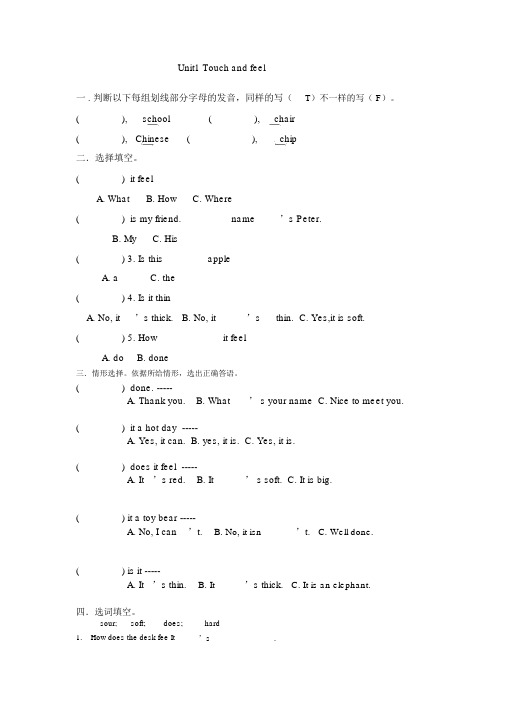
Unit1 Touch and feel一 . 判断以下每组划线部分字母的发音,同样的写(T)不一样的写( F)。
(),school(),chair(),Chinese(),chip二.选择填空。
()it feelA. WhatB. HowC. Where()is my friend. _________name’s Peter.B. MyC. His() 3. Is this ________appleA. a C. the() 4. Is it thin__________________A. No, it’s thick.B. No, it’s thin.C. Yes,it is soft.() 5. How ____________it feelA. doB. done三.情形选择。
依据所给情形,选出正确答语。
()done. -----__________________A. Thank you.B. What’ s your nameC. Nice to meet you.()it a hot day-----__________________A. Yes, it can.B. yes, it is.C. Yes, it is.()does it feel-----__________________A. It’s red.B. It’ s soft.C. It is big.() it a toy bear -----__________________A. No, I can’t.B. No, it isn’t.C. Well done.() is it -----__________________A. It’s thin.B. It’s thick.C. It is an elephant.四.选词填空。
sour;soft;does;hard1. How does the desk fee It’s ______________.2. How_____________it feel It’ s thin.3.Touch the banana. It is ___________________.4.Taste the lemon. It is ______________________.五.连词成句,并注意大小写及标点符号。
牛津版四年级下册英语知识点总结归纳-最新
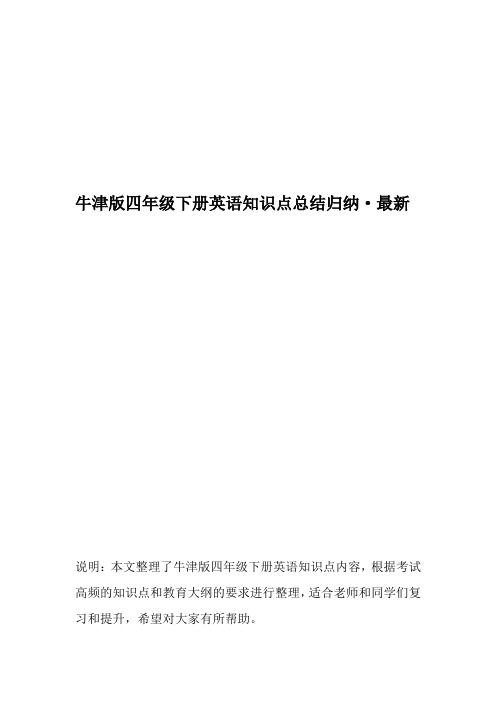
牛津版四年级下册英语知识点总结归纳·最新说明:本文整理了牛津版四年级下册英语知识点内容,根据考试高频的知识点和教育大纲的要求进行整理,适合老师和同学们复习和提升,希望对大家有所帮助。
目录Unit 1 Our school subjects (4)1、语音 (4)2、单词 (4)3、词组 (4)4、句型 (4)5、语法 (5)6、拓展 (5)Unit 2 After school (6)1、语音 (6)2、单词 (6)3、词组 (6)4、句型 (6)5、语法 (6)6、拓展 (7)Unit 3 My day (8)1、语音 (8)2、单词 (8)3、词组 (8)4、句型 (8)5、语法 (8)6、拓展 (8)Unit 4 Drawing in the park (10)1、语音 (10)2、单词 (10)3、词组 (10)4、句型 (10)5、语法 (11)6、拓展 (11)Unit 5 Seasons (12)1、语音 (12)2、单词 (12)3、词组 (12)4、句型 (12)5、语法 (12)6、拓展 (12)Unit 6 Whose dress is this? (14)1、语音 (14)2、单词 (14)3、词组 (14)4、句型 (14)5、语法 (14)6、拓展 (15)Unit 7 What’s the matter? (16)1、语音 (16)2、单词 (16)3、词组 (16)4、句型 (16)5、语法 (16)6、拓展 (16)Unit 8 How are you? (18)1、语音 (18)2、单词 (18)3、词组 (18)4、句型 (18)5、语法 (18)6、拓展 (19)Unit 1 Our school subjects1、语音字母a的读音/ eI / cake grape make skate2、单词1、school 学校 2. subject 课程 3. see 看见 4. Chinese 语文5. Maths 数学6. Music 音乐7. Art 美术8. lesson 课9. Monday 星期一 10.timetable 课程表 11. PE 体育12. Science 科学13. fun 乐趣,快乐 14. afternoon 下午 15. playground 操场3、词组1. our school subjects 我们的学校课程2. what subjects 什么课程3. like Chinese and Maths 喜欢语文和数学4. on Monday 在周一5. have an Art lesson 上一节美术课6. what about you 你呢7. go to the playground 去操场8. this afternoon 今天下午9. this morning 今天上午10. make a cake 做一个蛋糕11. what lessons 什么课12. go to 去13. our new timetable 我们的新课程表4、句型1. Welcome back to school. 欢迎回到学校。
牛津版英语四年级下Module1 Unit3同步知识巩固

学科教师辅导讲义年级:四年级辅导科目:英语课时数:3课题四年级下Module1 Unit3同步知识巩固教学目的根据教材内容,梳理本单元词汇、句型和语法知识,通过综合训练,提高能力。
教学内容Unit 3 Look at the shadow!Step1: Greetings & Free talk外国人见面聊天,总爱聊天气。
小朋友,今天天气怎么样呀?和你的老师来聊一下吧!Step2: Lead in -----小幽默Bring me the winnerA: Waiter, this lobster has only one claw. B: I'm sorry, sir. It must have been in a fight. A: Well, bring me the winner then.给我那个打赢的吧A:服务员,这个龙虾只有一只爪。
B:对不起,先生,这只肯定打过架了。
A:哦,那给我那个打赢的那只吧。
Step3: Words and expressions.I. Words 单词1.hill n. 小山;山丘[例词] a hill farm小山上的农场 a hill town 小山上的城镇[近义词] mountain高山[例句] Do you like climbing the mountains? 你喜欢爬山吗?2.lawn n. 草坪[例句] The children are playing volleyball on the lawn.孩子们正在草地上打排球。
[近义词] grass 草,草坪[例句] Please don't walk on the grass.请不要践踏草坪。
3.path n. 小路[例词] a garden path花园小路to walk along a path 沿小路前行[例句] Follow the path through the woods. 沿着这条小路穿过树林。
沪教牛津版小学四年级英语下册module1 unit2第3课时课件

very tall tree. He jumps and jumps. He wants to get the grapes. Again and
again he jumps, but he can’t get them. They are so high. Then he has an idea.
×
√
A: Are they grapes or watermelons? B: They are watermelons.
√
×
A: Is this strawberry juice or orange juice? B: It’s strawberry juice.
Presentation
Draw and write
沪教牛津版英语四年级下册
Module 1 Using my five senses
Unit 2 Smell and taste
Warm up
Let’s review
看图片说单词。
第三课时
smell
watermelon
strawberry
minute
grape
wait
those
get
or
A. You are right. B. How does it feel? C. Is it orange juice? D. Is it orange juice or lemon juice? E. How does it taste?
三、阅读短文,回答下列问题。
It is summer. A hungry and thirsty fox sees some round purple grapes in a
Listen and follow the tape.
沪教牛津版四年级下册英语Unit1第1课时教学课件
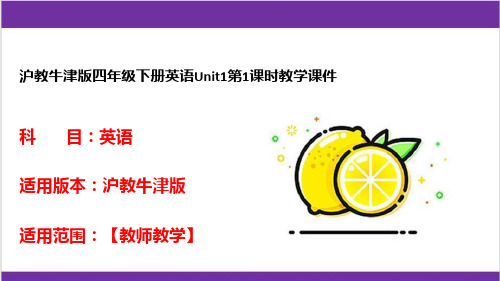
—No, it isn't. It's a toy bear. /Yes, it is! 3.能力目标:能够用英语询问和表达对物品的感受
第二页,共二十五页。
课堂导入
We use our eyes to___s_ee___.
第三页,共二十五页。
课堂导入
We use our ears to_____h_e_a.r
第二十五页,共二十五页。
第四页,共二十五页。
课堂导入
We use our hands to____to__u_c_h_a_n_d_.feel
第五页,共二十五页。
单元新词
动词:碰;触摸
例句: Touch this. What is it?
触摸一下这个。它是什么?
第六页,共二十五页。
单元新词
系动词:摸起来;感到
例句:How does it feel?
thick
✓
第十四页,共二十五页。
单词巩固
判断图片表达的意思和单词是否一致
soft
第十五页,共二十五页。
单词巩固
判断图片表达的意思和单词是否一致
thin
✓
第十六页,共二十五页。
Touch this, Alice. How does it feel?
Listen and say
What is it?
No, it isn't. It's a toy bear.
第十七页,共二十五页。
It's soft. Is it a toy dog?
Touch this, Alice. How does it feel?
Listen and say
四年级下册英语Unit5牛津版原文翻译

四年级下册英语Unit5牛津版原文翻译Does Alice like playing football?
艾丽斯喜欢踢足球吗?
Yes, she does.
是的,她喜欢。
①Joe: Look, Peter. There's a new football club in our school.乔:看,彼得。
我们学校有一个新足球俱乐部。
Peter: I like playing football.
彼得:我喜欢踢足球。
Joe: I like playing football too. Let's join the club.
乔:我也喜欢踢足球。
让我们加入这个俱乐部吧。
Peter: That's a good idea!
彼得:那是一个好主意!
②Joe: Let's tell Alice about the football club.
乔:让我们告诉艾丽斯这个足球俱乐部的消息。
Peter: Does Alice like playing football?
彼得:艾丽斯喜欢踢足球吗?
Joe: Yes, she does.
乔:是的,她喜欢。
Peter: Great! We can join the club together.
彼得:太好了!我们可以一起加入这个俱乐部。
四年级英语下册unit1 Touch and feel 练习 沪教牛津版(深圳用)(含答案)
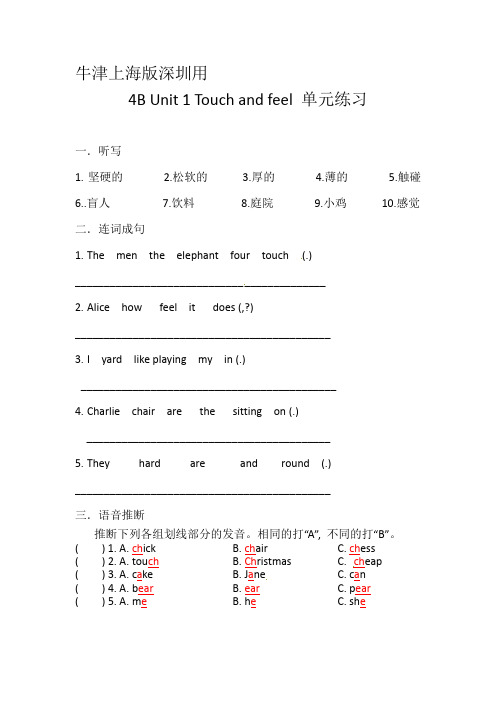
牛津上海版深圳用4B Unit 1 Touch and feel 单元练习一.听写1.坚硬的2.松软的3.厚的4.薄的5.触碰6..盲人7.饮料8.庭院9.小鸡10.感觉二.连词成句1.The men the elephant four touch (.)___________________________________________2.Alice how feel it does (,?)____________________________________________3.I yard like playing my in (.)____________________________________________4.Charlie chair are the sitting on (.)__________________________________________5.They hard are and round (.)____________________________________________三.语音推断推断下列各组划线部分的发音。
相同的打“A”, 不同的打“B”。
( ) 1. A. ch ick B. ch air C. ch ess( ) 2. A. tou ch B. Ch ristmas C. ch eap ( ) 3. A. c a ke B. J a ne C. c a n( ) 4. A. b ear B. ear C. p ear( ) 5. A. m e B. h e C. sh e四.选择填空从每小题的三个选项中选出最佳选项。
( ) 1. It’s _____. It’s a robot.A. softB. hardC. sweet( ) 2. The four men cannot see. They’re _______.A. hardB. thirstyC. blind( ) 3. --How ______this book feel? --It’s thin.A. doB. isC. does( ) 4. Lily has a new dress. It’s _____. She’s ______.A.soft,happyB.hard,happyC. soft,sad( ) 5. The tree is so big. It is very ______.A. thinB. thickC. small 五.阅读推断推断下列句子是否与短文相符,相符写“A”,不相符写“B”。
沪教牛津版小学四年级英语下册module1 unit3第3课时课件

3. —When does the sun ____E___ ? —The sun rises in the morning.
4. —When does the sun ___C____ ? —In the evening.
5. —Look at the stars. They are beautiful! —Yes. Let’s go out and ____B____ .
The sun rises in the morning. The shadow is long.
The sun is high in the sky . The shadow is short.
The sun goes down in the evening. The shadow is long.
二、单项选择。
1.Look! The sun ___C__down in the evening.
A. go
B. rises C. goes
2._A__,the sun rises behind the hill.
A. In the morning B. In the afternoon C. At noon 3.Theis___B____.
At night, the moon is high in the sky.
Let’s make sentence. long/short
The sun rises in the morning. The shadow is long.
The sun goes down in the evening. The shadow is long again.
A. happy B. afraid
C. lovely
沪教牛津版(深圳用)四年级英语下册Module2Unit5Sport体育运动知识梳理

沪教牛津版(深圳用)四年级英语下册Unit 5 Sport 体育运动语块整体记忆习惯搭配/短语:play football踢足球a new football club一个新足球俱乐部join the club加入俱乐部in the classroom在教室里play table tennis打乒乓球惯用语:1. That's a good idea!那是一个好主意!2. Great!太好了!3.How about Kitty?凯蒂呢?必会词汇sport体育运动;短语sports meeting运动会;短语a sports club体育运动俱乐部,play sports进行体育运动;例句Football is my favourite sport足球是我最喜欢的体育运动。
football足球;短语play football踢足球;同义soccer足球(英式);联想basketball篮球,volleyball排球;巧记foot(脚)+ball(球)=football(足球);例句They like playing football.他们喜欢踢足球。
club俱乐部;其他词义club兴趣小组;短语a chess club国际象棋俱乐部,a golf club高尔夫球俱乐部,a tennis club网球俱乐部;例句I want to join the swimming club.我想要加入游泳俱乐部。
join参加;加入;形近coin硬币;短语join a club加入俱乐部;例句Join us, please.请加入我们。
tell告诉;第三人称单数tells;动词-ing形式telling;过去式told;形近sell卖,tall高的,well好;近音tail n.尾,巴;短语tell sb. sth.告诉某人某事,tell sb. to do sth.告诉某人做某事;例句She told the good news to me.她把好消息告诉了我。
沪教牛津版小学英语四年级下册单词
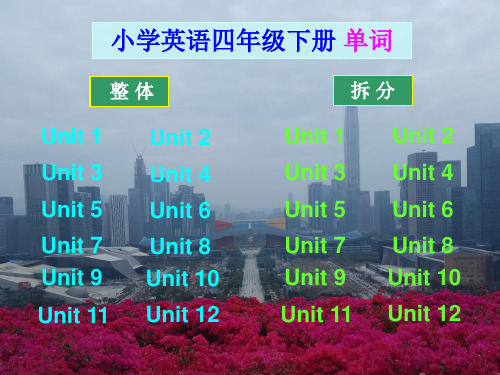
smell
闻;嗅
strawberry 草莓
or
或者;还是
watermelon 西瓜
grape
葡萄
fox
狐狸
round
圆的
Байду номын сангаас
purple
紫色的
wait
等待;等候
minute
一会儿;分钟
24
英中 全
Unit 2 - 02
get
得到
those
那些
25
英中 全
Unit 3 - 01
rise
升起
shadow 影子
15
Unit 8 - 02
clock 时钟;钟 play chess 下国际象棋 at the weekend 在周末 (be) late for 迟到
16
Unit 9 - 01
China 中国 talk 谈话;说话 May 五月 June 六月 January 一月 February 二月 March 三月 April 四月 July 七月 August 八月
17
Unit 9 - 02
September 九月 October 十月 November 十一月 December 十二月 email 电子邮件 hat 帽子 wear 穿;戴 yours 你的;你们的 every year 每年
18
Unit 10
garden 花园 plant 植物 leaf 叶子(复数leaves) water 给……浇水 them 他们;她们;它们 grow (使)生长;成长 seed 种子 every day 每天
21
Unit 12 - 02
into 朝;向;到……里面
- 1、下载文档前请自行甄别文档内容的完整性,平台不提供额外的编辑、内容补充、找答案等附加服务。
- 2、"仅部分预览"的文档,不可在线预览部分如存在完整性等问题,可反馈申请退款(可完整预览的文档不适用该条件!)。
- 3、如文档侵犯您的权益,请联系客服反馈,我们会尽快为您处理(人工客服工作时间:9:00-18:30)。
Discontent is the first step in progress.不满足是进步的开端。
Units 3 look and s eeGrade four一、词汇1.rise v.升起The sun rises in the east.太阳从东方升起。
拓展:rise过去式rose2.shadow n.影子My shadow is short at noon.我的影子在中午很短。
拓展:字母a在shadow中发3.noon n.中午I eat lunch at noon.我在中午吃午餐。
拓展:形近词:moon月亮合成词:afternoon下午at noon 在中午4.high adj.高的It's a high building.它是一栋很高的建筑物。
拓展:比较级:higher 最高级:higher 近义词:tall 反义词:low5.sky n.天空There is a plane in the sky.天空中有一架飞机。
拓展:in the sky在天空中对应词:ground地面6.go down落下The sun goes down. 太阳落山了。
7. evening n.傍晚,晚上Tom likes watching TV in the evening.汤姆喜欢在晚上看电视。
拓展:近义词:night in the evening在晚上this evening 今晚8.again adv.再,又Can you say it again,please?请你再说一遍好吗?拓展:形近词:gain 获得once again再一次again and again再三地9.night n.夜晚We are going to see a movie tomorrow night.我们打算明晚去看电影。
拓展:at night在夜晚day and night夜以继日反义词:day 近义词:evening 形近词:right 对的light 光10.moon n.月亮There's no moon tonight.今晚看不见月亮。
拓展:moon 月球moonlight 月光11. take a walk 散步My grandpa often takes a walk after supper.我爷爷经常在晚饭后散步。
拓展:近义词:gofor a walk去散步12.him pron(代词).他You can help him, and he can help you too.你能帮助拓展:对应词:her 主格:he13.stop v.停下Don't stop halfway.不要半途而废。
拓展:形近词:shop 商店stop n. 车站二、语法第一人称单数:I(我,作为主格) me(我,作为宾格)第一人称复数:we(我们,作为主格) our(我们的) us(我们,作为宾格)第二人称单数:you(你,作为主格或宾格) your(你的)第二人称复数:you(你们,作为主格或宾格) your(你们的)第三人称单数: he(他,作为主格) his(他的) him(他,作为宾格) she(她,作为主格) her(她,作为宾语) her(她的) it(它,作为主格或宾格) its(它的)第三人称复数:they(他们,她们,它们) their(他们的,她们的,它们的) them(他们,她们,它们,作为宾格)一般现在时一般现在时通常表示经常发生的动作或存在的状态。
1.一般现在时的形式含be(am,are,is)动词的一般现在时(1). 第一人称单数:I am+其他.e.g: I am a student.我是一名学生。
(2). 第一人称复数:We are +其他.e.g: We are good friends.我们是好朋友。
(3). 第二人称单数:You are+其他.You are a beautiful.你是一个漂亮的女孩。
(4). 第二人称复数:You are+其他.e.g: You are good friends.你们是好朋友。
(5). 第三人称单数: (he,she,it)+is+其他.e.g: He/She is a doctor.他/ 她是一名医生。
It is a warm day today.今天天气暖和。
(6). 第三人称复数:They are+其他.e.g: They are good friends.他们是好朋友。
随堂练习:A.填写正确的be动词形式1.She ____ a good teacher.2.I ____ a farmer.3.They ____ going shopping now.4.We ____ from China.5.He ____ taking a walk with his mother.6.It ____ a cute cat.7.You _____ a good students in the class.8.You _____ good friends.B.按要求填写be动词I ___ he ___ she ___ it ___ you ____we ____ they _____ you____2.谓语为实义动词的一般现在时(1). 第一、二人称单数( I/you )+动词原形+其他.e.g: I/You live in Beijing.我/你住在北京。
You _____(do) morning exercise every day.(2). 第三人称单数( he/she/it )+动词第三人称单数形式+其他.e.g: He/She work s in an office.他/她在一栋办公室里工作。
It works well.它运转正常。
She _____(eat) bread for breakfast.(3). 复数人称( we/you/they ) +动词原形+其他.e.g: We/You/They play football on Sundays.我们/你们/他们在星期日踢足球。
随堂练习:用给出单词的正确形式填空。
1.She _______(open) the door.2.He _______(come) into the classroom.3.I ________(like) apples and bananas.4. We often _______( write) to each other.5. You can _______(speak) Chinese.6. The rabbit ______(like) eating carrot.3.一般现在时的用法(1).表示经常性或习惯性的动作,常与always(总是),often(经常),usually(通常),every day(每天),sometimes(有时)等连用。
e.g: He often ride s a bike.他经常骑自行车。
(2). 表示现在的状态e.g: Look! Jane is in white today.看!简今天穿着白色的衣服。
You look tired.你看起来很累。
It’s windy today.今天有风。
(3). 表示事实或客观整理。
e.g: The earth go es around the sun.地球绕着太阳转。
May come s after April.五月在四月之后。
The sun rise s in the east.太阳从东方升起。
(4). 用在格言,谚语中。
e.g:Failure is the mother of success.失败是成功之母。
(5). 当主语为大三人称单数时,其后的动词也要变成相应的第三人称单数形式变化规则如下:a.一般在动词词尾加-s,s在清辅音后都/s/,在浊辅音或元音后读/z/。
e.g:like-likes, know-knowsb.以s,x,o,ch,sh结尾的动词加-es,es读作[iz]e.g:watch-watches, push-pushes。
C.以辅音字母加y结尾的动词,把y变i,再加-es,es读作[z]。
e.g:study-studies, fly-flies。
d.不规则变化e.g:have-has随堂练习:A.用所给单词的正确形式填空。
1. We often___________(play) in the playground.2. He always_________(get) up at six o’clock.3.He _________(brush) his teeth every morning.4. Danny _________study) English,Chinese,maths,science and art at school.5. Mike sometimes ________(go) to the park with his sister.6. At night, she __________(watch) TV with his parents.7. Mike________(read) English every day.8.I______(have) lunch at 12 o’clock.9.She _______(have) dinner in the evening.B.按要求写一写1.wash(第三人称单数)_________2.touch(第三人称单数)_________3.goes(复数形式)______4.study(第三人称单数)__________5.have(单数形式)________6.do(单数形式)_________一般疑问句的结构1.含有be动词或者情态动词的一般疑问句,其结构:be+主语+其他部分?情态动词+主语+动词原形+其他部分?肯定回答:Yes, 主语+be/情态动词.否定回答:No,主语+be/情态动词+not.秘诀:一提二变三问号一提:即把句中的be或情态动词提到句首二变:改换主语人称:第一人称变成第二人称,第二人称变成第一人称,同时some 改成any,and改为or.三问号:句末的句号改为问号(1).He is a student.一般疑问句:Is he a student?肯定回答:Yes, he is.否定回答:No, he is not./No, he isn’t.(2).They are kind people.一般疑问句:Are they kind people?肯定回答:Yes, they are.否定回答:No, they aren’t.(3). I am a doctor.一般疑问句:Are you a doctor?肯定回答:Yes, I am.否定回答:No, I’m not.(4). We can speak English.一般疑问句: Can you speak English?肯定回答:Yes, we can.否定回答:No, we can’t.随堂练习:A.按要求作答。
